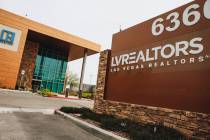Pros and cons of renting-to-own

The foreclosure crisis dumped many Las Vegans out of their homes with poor credit, a loss of equity and no next step to purchase a home.
Homebuyers with bad credit or who don’t have two years of employment history (which is typically necessary to qualify for a mortgage), have found an alternative to perpetually renting: rent to own homes.
How does it work?
Rent to own isn’t simply renting a home with an option to purchase it after the lease. Before signing an agreement, the buyer and seller agree to a home price, option, rent, rental credit, optional security deposit and lease terms.
In short, a rent-to-own home requires an option, or down payment, a monthly rent and a rental credit, which is the portion of the monthly rent that is applied to the price of the home purchase. For example, a rent-to-own house might require a $1,000 option (down payment to be applied to the purchase but due at the beginning of the lease), $1,300 monthly rent, and offer a $300 rental credit, which means each month $300 of the $1,300 is applied to the purchase. The remaining $1,000 is the seller/landlord’s income to keep.
The purchase price of the home should be set before the agreement begins.
“It is usually based on the current value plus a reasonable appreciation rate of 3 to 5 percent to cover each year the tenant/buyer may need,” said Kevin A. Dunlap, manager and realtor at VIP Realty.
Most rent-to-own homes run on a 12-month lease. At the end of the 12 months, the tenant is expected to obtain a home loan for the remainder of the purchase price.
So, if that tenant paid a $1,000 option and $300 a month for 12 months (or $3,600) toward a $200,000 home, he would be expected to pay $195,400 for the home at the end of the lease.
What’s the advantage?
When poor credit is an issue, renting-to-own gives a tenant the chance to rebuild her creditworthiness before trying to get a home loan.
This can not only help with obtaining a loan, but also with getting the best rate available.
“The advantage is that you are moving into the home prior to buying it,” Dunlap said.
By living there for a bit before making the commitment to buy, you can test out the area, the commute, check for problems or maybe just see if the airplanes overhead bother you.
When it comes time to buy, the price is already set by a contract and it can’t rise even if the market improves. Prices driven by competition are also null since the tenant is the only buyer able to purchase.
“If there are delays on getting the loan there is usually no issues with them since they are already in the home,” Dunlap said.
So, often, many landlord/sellers will extend a rent-to-own rental arrangement to allow more time for the loan.
What’s the disadvantage?
Monthly rents for rent-to-own homes are typically higher than comparable rents because “there is a rental credit that is added to the base rent and that will also be applied toward the purchase of the home when they decide to exercise the option and purchase it,” Dunlap said.
The rental credit is also designated for one specific house. So that credit that has been set aside for the purchase is nontransferable.
“The main disadvantage is that if they decide not to buy they lose their option money and rental credit,” Dunlap said. “The main reason they may not buy is that they never worked on their credit.”
The details
There are two options for the rental credit. The landlord could hold onto that money for the purchase of the home or it could be placed into escrow until the final purchase.
“If (the sellers) don’t have much equity then it is strongly recommended going through a title company or loan servicing,” Dunlap said.
“But, title companies don’t like doing extended escrows over 12 months.”
Also check the rental agreement for who is responsible for repairs to the home during the rental period before the purchase of the home. Contracts vary.
Dunlap’s best advice for buyers?
“Ensure you want to buy the home. This is not to be taken lightly as (you) are putting down significant amount of money. Also, read the contract to ensure there is no hidden language in it that is unfair to (you,) the tenant/buyer.”


















